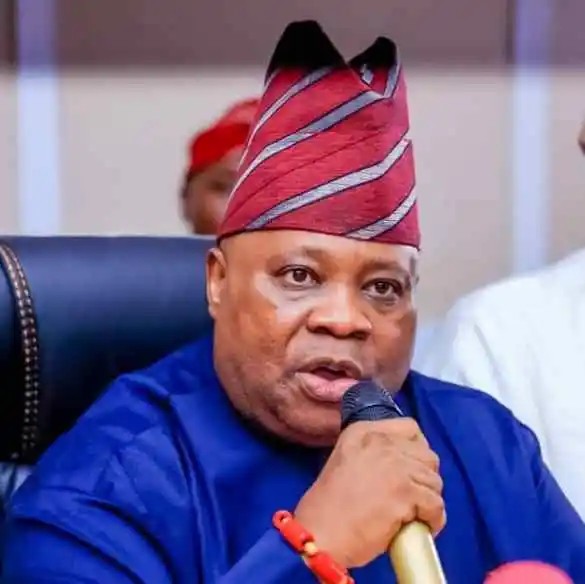#NigeriaDecides2023: How leading presidential candidates plan to reform Nigerian agriculture and boost food security
Ahead of Nigeria's presidential and National Assembly elections on February 25, presidential candidates from major parties have pledged to revamp the country's ailing agricultural and mining sectors if elected.
Previously, agriculture was the mainstay of the Nigerian economy. According to the World Bank, the sector employed more than 70% of the workforce, accounting for up to 62.3% of the country's foreign exchange earnings.
Since independence, several agricultural policies have been implemented to ensure food security in Nigeria, but the country is still struggling to achieve food sustainability. Food inflation has remained high, making it difficult for millions of Nigerians to afford basic meals as their incomes dwindle.
The situation is no different in the mining sector.
Nigeria is enriched with more than 34 commercially viable solid mineral deposits across the country, according to Nigeria's Extractive Industries Transparency Initiative (NEITI) Occasional Paper on Improving Transparency and Governance for Value Optimization in Nigeria's Mining Sector.
From 1903, the country experienced modest exploration and exploitation with intermittent growth, until 1960. Tin, columbite, coal, etc., were the first solid minerals that contributed significantly to the economy of Nigeria but have declined due to the oil boom which started in 1970 till date.
The sector is still largely underdeveloped despite its promising performance a few decades ago and huge proven deposits of valuable minerals across the country.
PREMIUM TIMES highlights the promises made by the main candidates in the upcoming elections.
 Peter Obi of the Labor Party
Peter Obi of the Labor Party
The former Governor of Anambra State, in his manifesto titled "Our Deal with Nigerians: Creating a New Nigeria", said he believed economic diversification could be achieved by increasing the added value and export potential of the country's agriculture and natural resources. resource value chain.
This, he said, would be achievable through targeted export incentives and deliberate actions to scale up manufacturing and technology development. He said his administration would create a controlled program of targeted funding for entrepreneurs leveraging the capacity development he described.
He also promised to create a sweeping reform of Nigeria's logistics and distribution systems, including ports, customs and trade facilitation instruments, to increase the competitiveness of our products and the ease of do business and reduce the high business costs that have hampered our non-oil business. export competitiveness.
 Peter Obi's Borno campaigns (PHOTO CREDIT: Peter Obi's Twitter handle)
Peter Obi's Borno campaigns (PHOTO CREDIT: Peter Obi's Twitter handle)Mr. Obi said he will strengthen product quality support to ensure that products are of good quality to gain market share with higher reputation advantage and brand opportunities to capture more value at within the AfCFTA and global markets.

"Incentivize and invest in the development of agricultural and industrial clusters in our geo-resource areas to take advantage of agglomeration and scale effects," he noted.
Mr. Obi, among others, has said he will aggressively prioritize the mechanization of the huge endowment of arable land across Nigeria, not...

Ahead of Nigeria's presidential and National Assembly elections on February 25, presidential candidates from major parties have pledged to revamp the country's ailing agricultural and mining sectors if elected.
Previously, agriculture was the mainstay of the Nigerian economy. According to the World Bank, the sector employed more than 70% of the workforce, accounting for up to 62.3% of the country's foreign exchange earnings.
Since independence, several agricultural policies have been implemented to ensure food security in Nigeria, but the country is still struggling to achieve food sustainability. Food inflation has remained high, making it difficult for millions of Nigerians to afford basic meals as their incomes dwindle.
The situation is no different in the mining sector.
Nigeria is enriched with more than 34 commercially viable solid mineral deposits across the country, according to Nigeria's Extractive Industries Transparency Initiative (NEITI) Occasional Paper on Improving Transparency and Governance for Value Optimization in Nigeria's Mining Sector.
From 1903, the country experienced modest exploration and exploitation with intermittent growth, until 1960. Tin, columbite, coal, etc., were the first solid minerals that contributed significantly to the economy of Nigeria but have declined due to the oil boom which started in 1970 till date.
The sector is still largely underdeveloped despite its promising performance a few decades ago and huge proven deposits of valuable minerals across the country.
PREMIUM TIMES highlights the promises made by the main candidates in the upcoming elections.
 Peter Obi of the Labor Party
Peter Obi of the Labor Party
The former Governor of Anambra State, in his manifesto titled "Our Deal with Nigerians: Creating a New Nigeria", said he believed economic diversification could be achieved by increasing the added value and export potential of the country's agriculture and natural resources. resource value chain.
This, he said, would be achievable through targeted export incentives and deliberate actions to scale up manufacturing and technology development. He said his administration would create a controlled program of targeted funding for entrepreneurs leveraging the capacity development he described.
He also promised to create a sweeping reform of Nigeria's logistics and distribution systems, including ports, customs and trade facilitation instruments, to increase the competitiveness of our products and the ease of do business and reduce the high business costs that have hampered our non-oil business. export competitiveness.
 Peter Obi's Borno campaigns (PHOTO CREDIT: Peter Obi's Twitter handle)
Peter Obi's Borno campaigns (PHOTO CREDIT: Peter Obi's Twitter handle)Mr. Obi said he will strengthen product quality support to ensure that products are of good quality to gain market share with higher reputation advantage and brand opportunities to capture more value at within the AfCFTA and global markets.

"Incentivize and invest in the development of agricultural and industrial clusters in our geo-resource areas to take advantage of agglomeration and scale effects," he noted.
Mr. Obi, among others, has said he will aggressively prioritize the mechanization of the huge endowment of arable land across Nigeria, not...
What's Your Reaction?






















